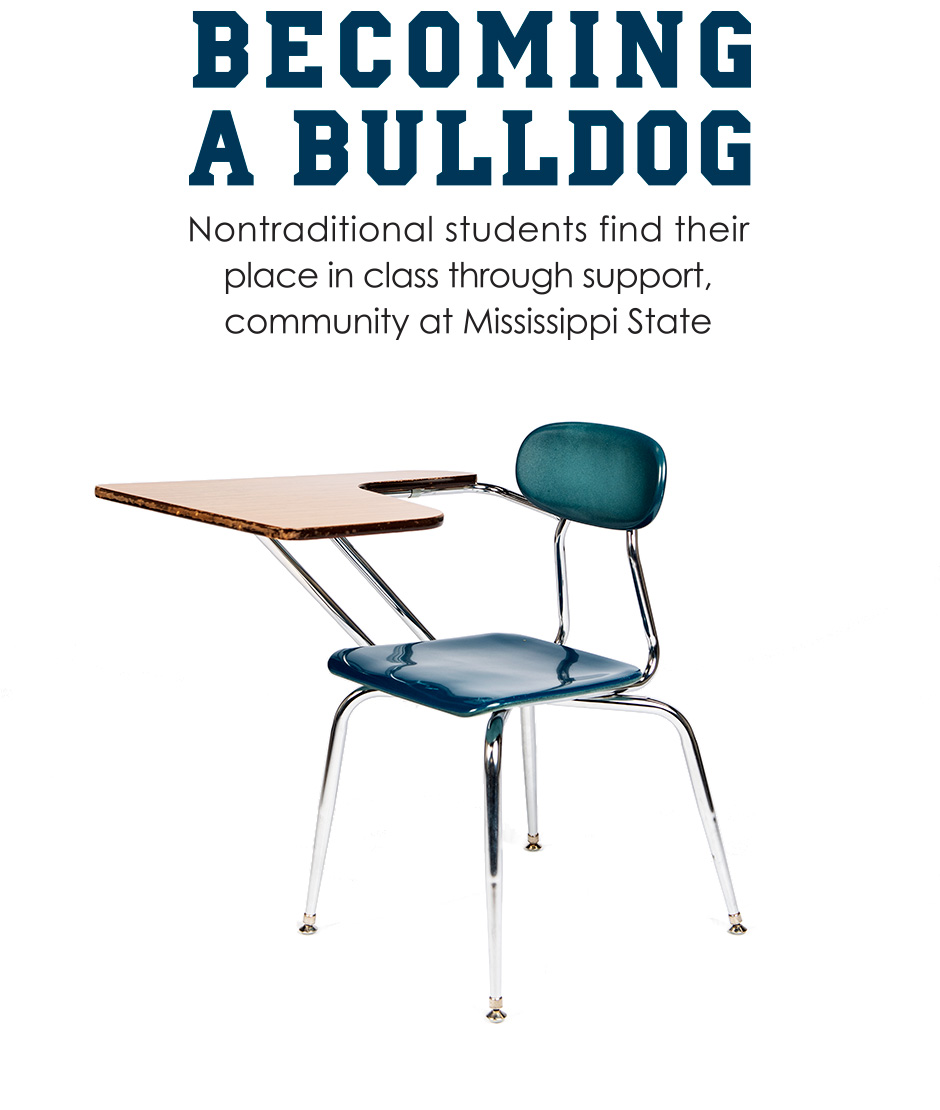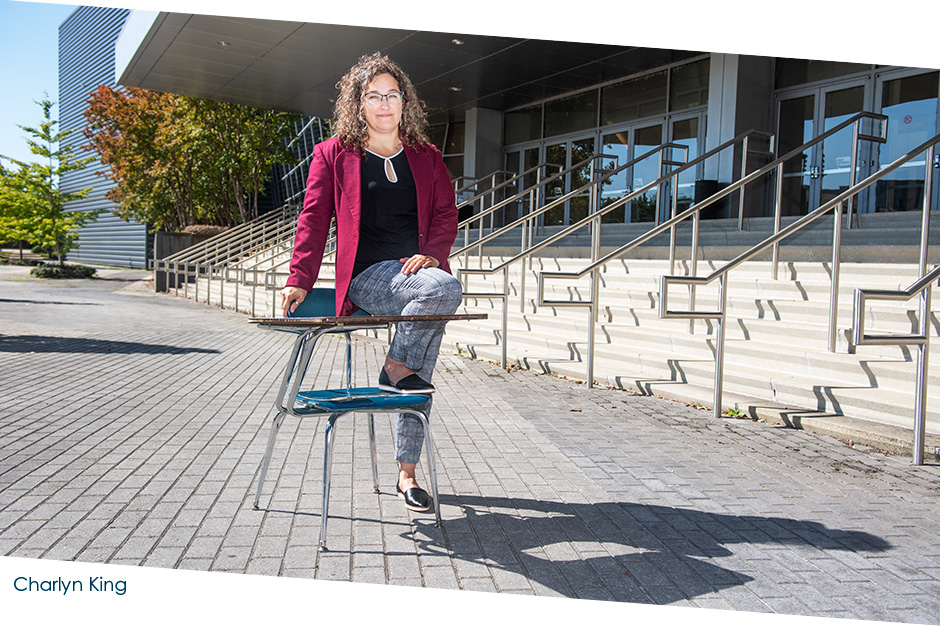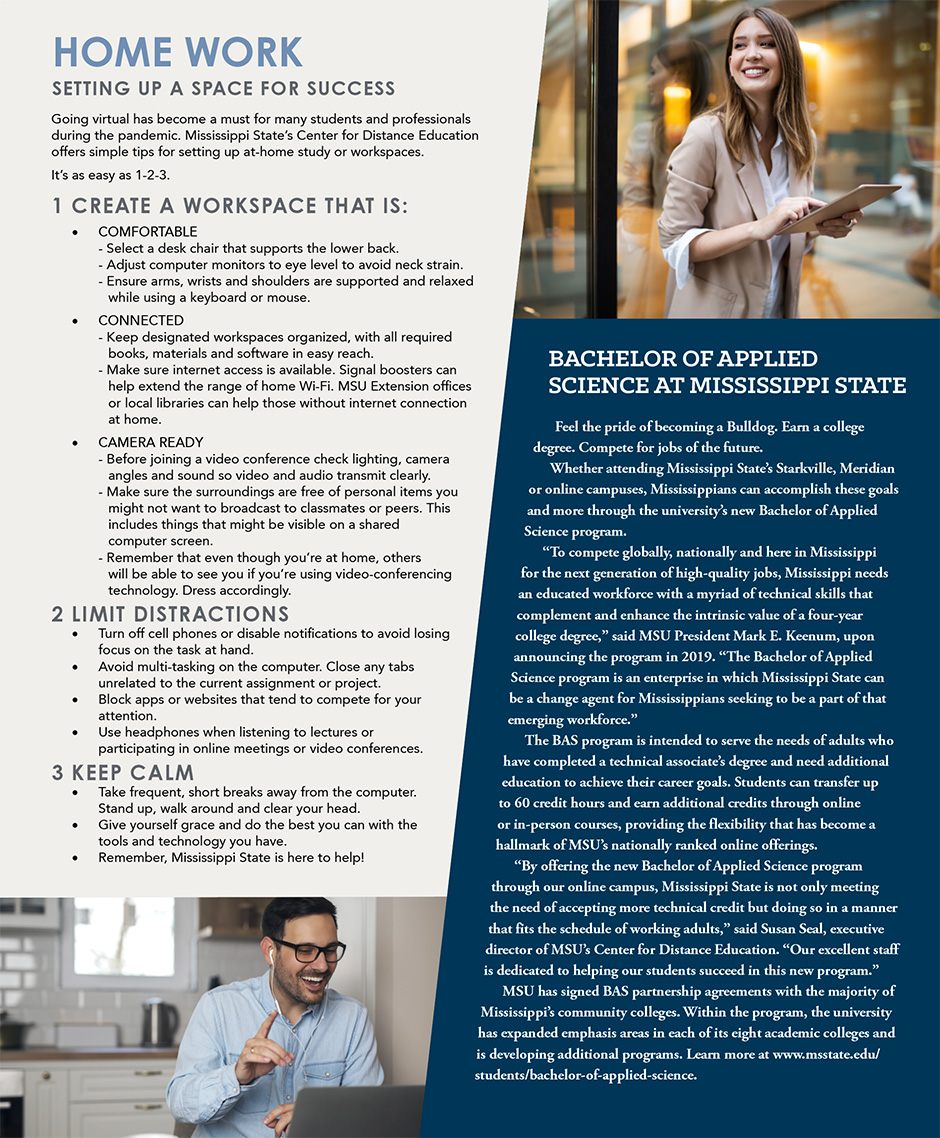
Balancing a job, family and other obligations keeps life busy for many adults, so pursuing a college degree may not seem possible. Mississippi State understands this, and that’s why the university offers various support, from generous scholarships to helpful staff to flexible degree programs, that help nontraditional students make the most of their time while earning a diploma.
Typically defined as someone older than 23 who did not enroll in college immediately or soon after high school graduation, nontraditional students often value flexibility, practicality and programs that allow them to not only capitalize on their life experiences, but gain new experiences that will lead to a career.
As the wife of a nontraditional student and manager of admissions and enrollment management for MSU’s Office of the Graduate School, Lindsey Shelton understands these needs, as well as the important role family and academic support play in a college experience. The MSU alumna said she draws from both perspectives to guide students on their path to a degree.
“I love seeing nontraditional students go back to school; it’s an admirable thing to do. They add so much to the dynamic of our campus and our classrooms because they’ve been out in the workforce and bring such great experience to the table,” said Shelton, who earned a bachelor’s in interdisciplinary studies in 2002. “These students set a good example for younger generations about the value of setting goals and working hard to earn the things you want no matter your age.”

Shelton, who also earned a master’s in 2014, said supporting those returning to school hits close to home. Her husband Bo Shelton, a lieutenant with the MSU Police Department’s Criminal Investigations Division, is working toward a bachelor’s in anthropology at MSU. After high school, Bo went straight into the Marines and then into public service as a fireman, medic and ultimately law enforcement officer. Fifteen years later, he decided it was time to return to school for a degree. He finished an associate’s in May and, with Lindsey’s support, decided to pursue a bachelor’s degree.
“It’s so exciting to see him working diligently to earn that diploma because he will always have it no matter what,” Shelton said of her husband. “Your circumstances can change at a moment’s notice, but no one can take away your degree once you have it. You’re never too old to go back to school.”
Nontraditional students at Mississippi State can get the academic advising and general support from the state’s Complete 2 Compete program. It helps adults age 21 and older who have not completed coursework in at least 24 consecutive months to complete a post-secondary degree. Mississippi State also has a new Bachelor of Applied Science program that allows students to apply technical education credits toward a bachelor’s degree.
Shelton stresses that adults should remember that no matter the obstacles, a college degree is a worthwhile pursuit.
“You may encounter a lot of roadblocks in your life, but don’t let that stop you from pursuing your goals. It takes great determination, but you can do it,” she said. “Two of our current students Charlyn King and Richard Hinshaw are great examples of how to make it happen.”
King, who holds an associate’s in drafting and design from Jones Junior College, said she first thought about pursuing another degree while serving in the Mississippi National Guard. Then “life happened.” She met her husband Tommy, an Army engineer officer and MSU business graduate, in 1993 and left the guard after the two started a family.
Their son Ryan, a 2017 anthropology graduate, is now pursuing an MSU master’s in English. Daughter Amelia is entering her fifth year in MSU’s School of Architecture. With three Bulldogs in the family, King said she didn’t want to miss out on the fun.
“Once our kids were at State, everyone inf the family was a Bulldog except me. I couldn’t let that happen,” she said with a laugh. “I thought, ‘If I go back to school, then all four of us can be Bulldogs.’ I’ve always loved making things and for my associate’s degree, I had to do a year of architectural drawing that I really enjoyed. I remember Ryan asking me if I ever thought about going back to school and when Amelia decided she wanted to investigate the architecture program at State for herself, that really made me start thinking about it again.”
Flash forward three years and King says she couldn’t be happier to be a Bulldog. She said everyone she’s interacted with in the College of Architecture, Art and Design—and MSU as a whole—has been friendly and accommodating, so her transition from prospective to full-time student went smoothly. She received a donor-supported MSU Compass Scholarship and is proud to have been inducted into MSU’s chapter of Tau Sigma Delta architectural honor society.
“As an adult student, I think most of my initial obstacles or concerns were self-imposed. State has been great about setting me up for success,” she said. “The architecture staff spent a lot of time explaining the application process, so I felt like I had the information and support I needed to accomplish this goal.”
King said she’s also grateful to the staff of Mississippi State’s G.V. “Sonny” Montgomery Center for America’s Veterans.
“In some of my classes, I have needed to print something or needed a workspace outside of the studio, and the veterans center in Nusz Hall has been a nice resource,” she said. “It’s been a huge bonus to be able to connect with people who have the same experiences in terms of serving in the military.”
The classroom experience has been just as enjoyable, King said.

“One of my biggest concerns was that my classmates would have this preconceived idea of ‘She’s Amelia’s mom; she’s so old,’” King said with a laugh. “Amelia has given me a lot of support and been a great source of information, particularly with technology since it’s changed a lot since the last time I was in school. Other students and professors have really been open to making me a part of this campus. I’m glad I’ve had this opportunity to be in an environment with other creative people.”
If things go as planned, the King family will have much to celebrate next spring when Charlyn, Ryan and Amelia are slated to graduate. King said she’s excited to see the light at the end of the tunnel and hopes to continue her education through pursuit of an architect’s license and additional training opportunities. She encourages prospective nontraditional students to simply “go for it.”
“Even if you don’t have another career on the horizon, it’s still fun to continue learning and to be around people who are interested in the same thing you are,” she said. “You might learn something new about yourself.
“I struggled my first time in college,” she continued. “When we’re in our 20s, we think we have to pick the right major, get the right job and make all of the right choices or the world will end, but it’s so important to just keep experiencing new things and realize that life doesn’t end just because you’re 50 and your kids go off and have their own lives now. Everything in the world is changing, including technology, and being able to learn about those changes at Mississippi State has been an eye-opening experience. I’ve had a lot of fun.”
In addition to providing the academic and financial support that King relishes, Mississippi State is helping working adults expand their education through convenient, affordable online degree programs. The university currently offers more than 50 accredited online programs, making bachelor’s, master’s, doctorates and professional certificates available to anyone with internet access, including Gulfport resident and distance education student Richard Hinshaw.
Hinshaw, who is in his late 60s, said the decision to pursue a master’s in instructional technology stemmed from his desire to be a lifelong learner.
“Some people thought I was crazy for wanting to do school stuff at my age,” he said. “Someone asked me, ‘What are you going to do when you grow up?’ I said, ‘Hopefully, I’ll never grow up.’ I’m not going to sit and twiddle my thumbs. I like learning and technology, so I decided to go back to school. If you stop thinking and learning, you’re crazy.”
In 1972, Hinshaw earned a bachelor’s degree in advertising from the University of Florida. His post-graduation career in newspaper and radio took him all over the country before he officially put roots down in Mississippi. In addition to pursuing a master’s degree online, he said he enjoys conducting media research and helping clients enhance customer engagement through direct mail.
“I have been very fortunate to have worked with and for a lot of good people for long periods of time, and I think I’ve learned a little bit from every place I’ve been,” he said. “That’s the attitude I’ve always had with life. No matter what, you must learn from each experience, so you can work smarter and make things better.’”
Now happily residing on the Gulf Coast with his wife Teresa, daughter Abby and beagle Lazlo, Hinshaw said Mississippi State and its “good people” have given him the knowledge and support he needs to excel.
“When I started looking into what’s possible for me in terms of another degree, I actually reached out to three different schools to get more information on what was available. Mississippi State was the only one that responded,” he recalled. “I didn’t know where to start out, but I ended up speaking with Angie Campbell at the graduate school who was very helpful and offered suggestions about programs that sounded pretty neat.”
Hinshaw said he’s also grateful for proactive professors, including his adviser Chien Yu in the College of Education’s Department of Instructional Systems and Workforce Development.
“Dr. Yu is great. She always responds to emails and has been helpful to me, especially with things I hadn’t done for the first time,” he said. “I had a lot of problems when working on a lesson plan, and she spent a lot of time helping me through it. Everybody else I’ve worked with here has had a fantastic attitude, too. They want to see you do you well, which is neat.”
Though not in any rush to finish, Hinshaw said he is happy to be about halfway through his degree program. He is taking two online courses this fall and planning for additional ones in the spring and summer.
“You can be a school known for this or that, but having good people has a lot to do with everything, and the people at State are incredible,” he said. “The encouragement and support they provide is very good and appreciated.”
By Sasha Steinberg | Photos by Beth Wynn

